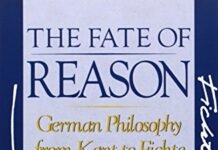
Ebook Info
- Published: 2008
- Number of pages: 745 pages
- Format: PDF
- File Size: 2.01 MB
- Authors: Frederick C. Beiser
Description
One of the very few accounts in English of German idealism, this ambitious work advances and revises our understanding of both the history and the thought of the classical period of German philosophy. As he traces the structure and evolution of idealism as a doctrine, Frederick Beiser exposes a strong objective, or realist, strain running from Kant to Hegel and identifies the crucial role of the early romantics—Hölderlin, Schlegel, and Novalis—as the founders of absolute idealism.
User’s Reviews
Reviews from Amazon users which were colected at the time this book was published on the website:
⭐There are a number of reviews lauding this book and I agree it should be lauded but perhaps something else needs to be said before someone buys it hoping for a readable introduction to German idealism. For that purpose I would recommend Pinkard’s “German Philosophy 1760-1860: The Legacy of Idealism”. That book provides an overview of the thinking of the important German Idealists of the period including Hegel. Beiser’s book is a more closely argued exegesis of points that might be considered arcane by a general reader looking for such an overview. An example might help. A number of the early chapters are about Kant but not in the form of an explanation of his works, rather they discuss where and how Kant refuted predecessors (Descartes, Leibniz and Berkeley) he believed were empirical ‘idealists’ and in err (in Kant’s view empirical “idealists’ believed that either external reality might not exist- the skeptical idealists such as Descartes- or didn’t exist- the dogmatic or Platonic idealists such as Leibniz and Berkeley). Now Kant of course was an idealist but transcendentally and therefore more or less a constructivist who believed the mind imposed a form on sensation and an order on its processing that acts as an impenetrable barrier to an understanding of reality but, by the same token sincethe wiring for our sensations and their processing is intersubjective, we are able to have a shared reality (just not ‘real’ reality). Hence theconnection with the rest of the title “The struggle against subjectivity”- developing a philosophy that weaves together the then increasingly clearunderstanding that we don’t have immediate access to the external world with the conflicting but complementary understanding that we think we do since we can validate our beliefs about the outside world through others like us.The above debate between Kant and those whom he is critical of is developed in some detail by Beiser using Kant’s various works to find support for the book’s thesis (and of course it moves in the same vein through later so-called idealists as they struggle with the problem of ‘subjectivity’- and in that sense I do agree it was a mistake leaving Hegel out since, however one receives his philosophy, it was directed at exactly that problem) . This book then might be a slog unless the reader is interested and curious about the very specific arguments for each of the philosophers covered that bear on the subtitle.
⭐This is probably close to one of the best philosophy books I have ever read. If you believe, like Hegel, the journey is as important as the destination, this this book is one of the most extraordinary philosophical magic carpet rides as you could possibly experience. In fact, I would not hesitate to call it an utter revelation. It is as beautifully written as it is a magical voyage of discovery.Now it all seems so much clearer how we got from Hume to Kant, then through Hölderlin, Schelling, Fichte and then to Hegel. But so much beyond that also becomes clearer, particular how Schopenhauer fits in to it all. Not only that but how the overarching influence of Spinoza fits into it all. That alone makes Nietzsche seem but a minor offshoot of the German traditional. Even Sartre seems little more than a second or third rate re-run of Fichte.I could scarcely put this mighty tome down, and found myself gripped by it from beginning to end. Since devouring it from cover to cover, I have come back to it often, only to find myself just as engrossed by it as I ever was. I quote from the book often, and find myself totally in agreement with Beiser, and am always left wishing I could have put it better myself.Even in the German language literature there is scarcely anything so wide ranging in its scope and prowess. It is truly a landmark work.
⭐This review is primarily a review of Beiser’s treatment of Schelling. As an undergraduate monolingual English speaker undertaking self-directed study of Schelling, I have found available introductory resources to this topic in English lacking. This book provides a comprehensive and detailed exposition of Schelling’s early period that few other resources in English appear to provide. Beiser’s writing is lucid, very well researched, and displays a passion for the subject matter which is utterly contagious. I thoroughly recommend this book for those seeking a detailed introduction to the early work of Schelling and his relation to Fichte and Kant in particular, as well as those interested in post-Kantian German philosophy in general.
⭐Unbelievably comprehensive, not a quick read, but it manages to make Kant understandable, and has everything you ever wanted to know about German Idealism, and Romanticism.
⭐I found this pretty useful on German Idealism’s response to the question of knowledge of the external world. It was interesting on often unfairly neglected contributors such as Holderlin and Maimon and smart in that it didn’t go into detail on Hegel – on whom there is already plenty. Personally I would have liked more on Schelling’s `schematic’ link between the finite and infinite in his System of Transcendental Idealism – maybe some kind soul could point out secondary sources, but maybe not!
Keywords
Free Download German Idealism: The Struggle against Subjectivism, 1781–1801 in PDF format
German Idealism: The Struggle against Subjectivism, 1781–1801 PDF Free Download
Download German Idealism: The Struggle against Subjectivism, 1781–1801 2008 PDF Free
German Idealism: The Struggle against Subjectivism, 1781–1801 2008 PDF Free Download
Download German Idealism: The Struggle against Subjectivism, 1781–1801 PDF
Free Download Ebook German Idealism: The Struggle against Subjectivism, 1781–1801





